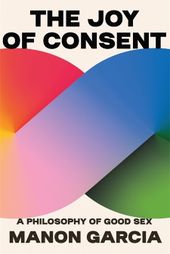
The Joy of Consent
In the age of #MeToo, consent has become the answer to problems of sexual harassment and violence: only if all parties agree to sex, the act is legitimate. Critics argue that consent, and the awkwardness of confirming it, rob sex of its sexiness. However, opposing the consent regime means defending a masculine erotic of silence and mystery, a pillar of patriarchy.
In The Joy of Consent, French philosopher Manon Garcia upends the assumptions that underlie this very American debate, reframing consent as an ally of pleasure rather than a legalistic killjoy. In doing so, she rejects conventional wisdom on all sides. As a legal norm, consent can prove rickety: consent alone doesn’t make sex licit—adults engaged in BDSM are morally and legally suspect even when they consent. And nonconsensual sex is not, as many activists insist, always rape. People often agree to sex because it is easier than the alternative, Garcia argues, challenging the simplistic equation between consent and noncoercion.
Drawing on sources rarely considered together—from Kantian ethics to kink practices—Garcia offers an alternative framework grounded in commitments to autonomy and dignity. While consent, she argues, should not be a definitive legal test, it is essential to realizing intimate desire, free from patriarchal domination. Cultivating consent makes sex sexy. By appreciating consent as the way toward an ethical sexual flourishing rather than a legal litmus test, Garcia adds a fresh voice to the struggle for freedom, equality, and security from sexist violence. During this event Garcia will engage in a round-table discussion with Petra Van Brabandt, Lillian Cicerchia, and Maria Mikkola.
About the speakers
Manon Garcia is the author of We Are Not Born Submissive: How Patriarchy Shapes Women’s Lives and The Joy of Consent: A Philosophy of Good Sex. A Junior Fellow at the Harvard Society of Fellows and a junior professor of moral and political philosophy at Freie Universität Berlin, she has taught at the University of Chicago and Yale University. She received the Prix des Rencontres Philosophiques de Monaco for the best book of philosophy published in France in 2022.
Petra Van Brabandt is heading the research department at Sint Lucas School of Arts Antwerpen. She is a feminist philosopher writing about art and pornography.
Lillian Cicerchia is an Assistant Professor of Political Theory at the University of Amsterdam with a focus on political economy, feminism, and critical theory. Her research in these areas can be found in Hypatia: A Journal of Feminist Philosophy, the European Journal of Political Theory, and Social Theory & Practice. She is also a contributor to Jacobin, Catalyst Journal, and Dissent.
Mari Mikkola is a Professor of Philosophy and Chair of Metaphysics at the University of Amsterdam. Her areas of expertise are in feminist philosophy (particularly feminist metaphysics), social ontology, and pornography debates in philosophy. She has published widely on these topics being the sole author of two books, The Wrong of Injustice: Dehumanization and Its Role in Feminist Philosophy and Pornography: A Philosophical Introduction, and of several articles. Mikkola’s current work deals with philosophical methodology, and conceptions of prejudicial speech.
Linda Duits (moderator) is a social scientist specialized in popular culture, particularly in the fields of gender and sexuality. She teaches in the Media & Culture department at the University of Amsterdam and is affiliated with the Institute for Cultural Inquiry at Utrecht University as a researcher. She has authored several books, including Eindelijk weten wat seks is (Finally Knowing What Sex Is) and Dolle mythes: feminisme toen en nu (Mad Myths: Feminism Then and Now). Currently, she is working on a new book about pleasure.

:rgb(-15)

:rgb(-25)

:rgb(8)
